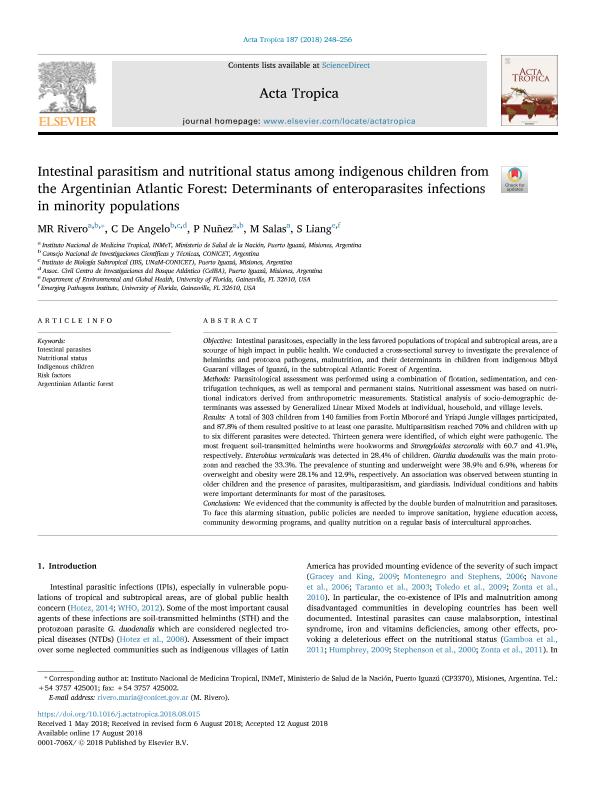Artículo
Intestinal parasitism and nutritional status among indigenous children from the Argentinian Atlantic Forest: Determinants of enteroparasites infections in minority populations
Fecha de publicación:
11/2018
Editorial:
Elsevier Science
Revista:
Acta Tropica
ISSN:
0001-706X
e-ISSN:
1873-6254
Idioma:
Inglés
Tipo de recurso:
Artículo publicado
Clasificación temática:
Resumen
Objective: Intestinal parasitoses, especially in the less favored populations of tropical and subtropical areas, are a scourge of high impact in public health. We conducted a cross-sectional survey to investigate the prevalence of helminths and protozoa pathogens, malnutrition, and their determinants in children from indigenous Mbyá Guaraní villages of Iguazú in the subtropical Atlantic Forest of Argentina. Methods: Parasitological assessment was performed using a combination of flotation, sedimentation, and centrifugation techniques, as well as temporal and permanent stains. Nutritional assessment was based on nutritional indicators derived from anthropometric measurements. Statistical analysis of socio-demographic determinants was assessed by Generalized Linear Mixed Models at individual, household, and village levels. Results: A total of 303 children from 140 families from Fortin Mbororé and Yriapú Jungle villages participated, and 87.8% of them resulted positive to at least one parasite. Multiparasitism reached 70% and children with up to six different parasites were detected. Thirteen genera were identified, of which eight were pathogenic. The most frequent soil-transmitted helminths were hookworms and Strongyloides stercoralis with 60.7 and 41.9%, respectively. Enterobius vermicularis was detected in 28.4% of children. Giardia duodenalis was the main protozoan and reached the 33.3%. The prevalence of stunting and underweight were 38.9% and 6.9%, whereas for overweight and obesity were 28.1% and 12.9%, respectively. An association was observed between stunting in older children and the presence of parasites, multiparasitism, and giardiasis. Individual conditions and habits were important determinants for most of the parasitoses. Conclusions: We evidenced that the community is affected by the double burden of malnutrition and parasitoses. To face this alarming situation, public policies are needed to improve sanitation, hygiene education access, community deworming programs, and quality nutrition on a regular basis of intercultural approaches.
Archivos asociados
Licencia
Identificadores
Colecciones
Articulos(CCT - NORDESTE)
Articulos de CTRO.CIENTIFICO TECNOL.CONICET - NORDESTE
Articulos de CTRO.CIENTIFICO TECNOL.CONICET - NORDESTE
Articulos(IBS)
Articulos de INSTITUTO DE BIOLOGIA SUBTROPICAL
Articulos de INSTITUTO DE BIOLOGIA SUBTROPICAL
Citación
Rivero, Maria Romina; de Angelo, Carlos Daniel; Nuñez, Pablo Alfredo; Salas, M.; Liang, S.; Intestinal parasitism and nutritional status among indigenous children from the Argentinian Atlantic Forest: Determinants of enteroparasites infections in minority populations; Elsevier Science; Acta Tropica; 187; 11-2018; 248-256
Compartir
Altmétricas




